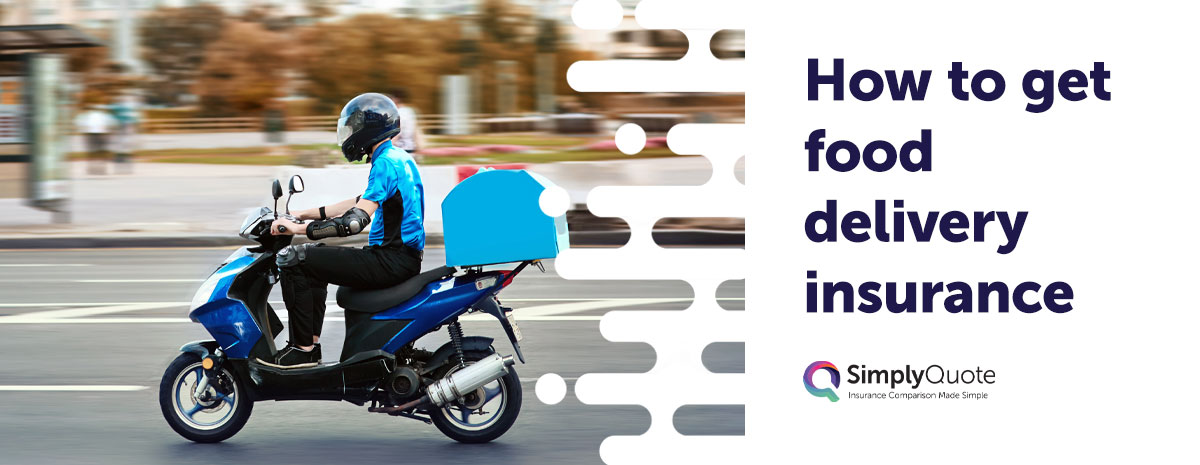How to get food delivery insurance
The demand for quick and convenient meal solutions has led to a boom in the food delivery sector. In the UK, where getting your favourite meals delivered right to your doorstep has become a part of everyday life, it’s crucial to protect your delivery business.
With the UK making up a large chunk of Europe’s takeaway sales, ensuring your business is covered financially is essential, whether you’re delivering locally or to a wider area.
In this article, you’ll find straightforward advice on getting the right food delivery insurance. We’ll show you how to pick the best provider and what you need to get your policy set up. Read on for practical tips on keeping your business safe and sound.

Why you should consider using a comparison site
When hunting for food courier insurance—or any insurance, really—an online comparison site like SimplyQuote is a great starting point.
This method allows you to survey the entire market, ensuring you don’t just settle for the first option you stumble upon, which might not be the most beneficial for your business.
Another approach is to contact insurance companies directly. This can sometimes save you from extra fees associated with third parties, though it’s worth noting that not all companies will deal directly with customers, and many prefer working through brokers.
Getting in Touch with Brokers
If you’re new to food delivery insurance, working with brokers can be particularly helpful. They have a deep understanding of the market and can steer you towards the best policy for your needs. While there is a fee for their services, their expertise can often lead to a more tailored and cost-effective insurance solution.
Looking for cheap Food Delivery Insurance? Get your quote today!
Get QuotesWhat information do I need to get food delivery insurance?
Securing food delivery insurance requires gathering some key information about both you and your vehicle. Here’s what you’ll typically need to provide:
- Registration Number: To identify your vehicle.
- Your Postcode: This affects insurance premiums, as different areas have varying risk profiles.
- Date of Birth: To assess eligibility and determine rates based on age.
When applying for insurance, the company you choose to deliver for can also influence what additional information is required. For example, working with major platforms like Uber Eats, Deliveroo, or Just Eat may necessitate specific policy features that align with their partnership requirements.
Depending on how you choose to obtain your insurance—via an online comparison site like SimplyQuote, directly from an insurer, or through a broker—you may need to provide extra details, such as:
- Vehicle Make and Model: Important for assessing the vehicle’s value and risk.
- Driving History: Including any claims or traffic violations.
- Type of Delivery Vehicle: Whether you’re using a car, scooter, or bike, as different vehicles have different insurance requirements.
- Work Pattern: How often you plan to make deliveries, as this can affect whether a pay-as-you-go, monthly, or annual policy is more suitable.
Ensure you have all necessary documentation about your vehicle and any previous insurance ready to streamline the process. Being well-prepared not only expedites your application but also ensures you can quickly start delivering and earning.
How much does food delivery insurance cost?
The cost of food delivery insurance varies widely, depending on several key factors such as the type of vehicle you use, your driving history, and where you live.
To help you understand the potential costs, we’ve compiled the typical rates into a clear table format. This table showcases the variations in pricing for different types of insurance policies and vehicles:
| Insurance Type | Vehicle Type | Cost Range |
|---|---|---|
| Pay-As-You-Go | Car | Up to £0.80 per hour |
| Scooter | Up to £0.70 per hour | |
| Monthly Insurance | Car | From £90 for 30 days |
| Scooter | From £50 for 30 days | |
| Van | From £110 for 30 days | |
| Annual Policies | Car | From £930 annually |
| Scooter | From £890 annually | |
| Van | From £1010 annually |
How to compare food delivery insurance quotes
When you’re looking to secure the best takeaway delivery insurance, using a comparison site like ours can streamline the process significantly.
These platforms allow you to view multiple quotes from various insurers side by side, helping you gauge the market comprehensively.
Here are some steps to effectively compare insurance quotes:
- Gather Multiple Quotes: Start by collecting quotes from several insurance providers. This variety gives you a broader perspective, ensuring you don’t just settle for the first option you find.
- Evaluate Cover Details: Pay close attention to what each policy covers. Some might offer extensive cover with higher premiums, while others might be more cost-effective with less comprehensive cover.
- Check Costs: Look at both the premiums and the overall annual or monthly costs. This will help you understand how much you’ll be paying over the term of the policy.
- Consider the Provider’s Reputation: While it’s tempting to go for the cheapest option, it’s also important to consider the insurer’s reputation. Established providers with a strong track record might offer more reliability and better customer service compared to lesser-known companies.
- Value for Money: Not all policies are created equal. Some might offer better value for your money, providing the cover you need at a price that fits your budget without compromising on service or benefits.
How to get an accurate food delivery insurance quote
Securing an accurate quote for fast food delivery insurance is crucial for keeping your business profitable and compliant.
To start, choose a trusted comparison site like SimplyQuote, which specialises in comparing insurance options to bring you the best deals.
Understanding your business’s specific insurance needs is important. This includes knowing the type of vehicle you use, the scope of cover you’re looking for, and how frequently the vehicle will be on the road. Providing comprehensive and accurate information about your operations and vehicle will help the comparison site generate the most relevant quotes for you.
Once you receive these quotes, take your time to go over them. Look at the different offerings not just in terms of price but also on how well they meet your specific requirements. Remember, the cheapest option isn’t always the best if it doesn’t provide the cover you need.
Lastly, always ensure that the insurance plan you choose complies with all legal requirements for food delivery in the UK. Operating without proper insurance isn’t just risky—it’s illegal and can lead to serious repercussions for your business.
By carefully following these steps and using a reliable platform like SimplyQuote, you can confidently find the right insurance provider that fits your business needs and budget, ensuring you’re fully prepared to serve your customers across the UK.
Is it a legal requirement to have food delivery insurance?
Yes, it is a legal requirement in the UK to have specific insurance for vehicles used in food delivery.
Standard car insurance policies do not cover activities that involve hire and reward, such as delivering food. This kind of driving necessitates a bespoke policy designed to address the unique risks associated with food delivery operations.
Without this specialised insurance, drivers not only risk facing legal penalties but are also vulnerable to being uninsured in case of accidents while on duty. Therefore, securing proper food delivery insurance is essential for legal compliance and to safeguard your business in the food delivery industry.
How does food delivery insurance differ from traditional car insurance?
Food delivery insurance differs significantly from traditional car insurance due to its specific focus on commercial activities.
Unlike standard car insurance, which covers personal use and commuting, food delivery insurance is designed to cover hire and reward activities. This includes any driving undertaken to transport goods or passengers for a fee.
Key Differences Include:
- Cover Scope: Food delivery insurance provides comprehensive cover for accidents, theft, and damages specifically incurred during delivery activities—situations that are typically not covered under personal car insurance policies.
- Purpose of Use: Traditional car insurance covers drivers for personal use, including commuting to work or leisure activities. In contrast, food delivery insurance exclusively covers commercial use, particularly when goods are being transported as part of a paid service.
- Risk Management: Given the increased risks associated with frequent stops, time pressures, and varied locations typical of delivery services, food delivery insurance is structured to address these unique challenges, protecting both drivers and the business from potential financial liabilities.
By catering to the specific needs of delivery operations, food delivery insurance ensures that drivers and businesses are adequately protected against the unique risks they face, which is beyond the scope of traditional car insurance.
Looking for cheap Food Delivery Insurance? Get your quote today!
Get QuotesHow does pay-as-you-go delivery insurance work?
Pay-As-You-Go (PAYG) delivery insurance is a flexible form of vehicle insurance specifically designed for drivers who engage in hire and reward activities.
This type of insurance acts as a ‘top-up’ to a standard vehicle insurance policy, activating only when the driver is actually making deliveries.
Key Features of PAYG Insurance:
- Activation: PAYG insurance is unique because it only covers you during the time you are actively delivering. This means you aren’t paying for insurance when you’re not working, making it a cost-effective option for drivers who do not work regular shifts.
- Cover: It provides all the necessary protections of regular hire & reward insurance, such as cover for accidents, theft, and other damages that occur during delivery periods.
- Flexibility: This insurance is ideal for drivers who need flexibility. Whether you deliver sporadically or part-time, PAYG insurance adjusts to your schedule, ensuring you are only insured when you need to be.
PAYG insurance is particularly beneficial for delivery drivers who require a tailored insurance solution that aligns with their varying work hours, offering them financial efficiency and essential coverage without the overhead of a constant premium.
Why does food delivery insurance cost more than personal car insurance?
Food delivery insurance typically incurs higher costs than personal car insurance due to the specific challenges and risks associated with the delivery industry.
Delivery drivers often find themselves driving under time pressure to meet customer expectations. This urgency can increase the likelihood of accidents, as quick deliveries often require faster driving and quicker decision-making.
Additionally, much of the delivery work, especially in the fast food sector, takes place during evening hours. Driving at night introduces additional hazards such as reduced visibility and the higher prevalence of impaired drivers on the road. Moreover, the nature of delivery work involves frequent stops and starts—particularly in urban settings with congested traffic—further elevating the risk of incidents.
By opting for specialised food delivery insurance, businesses ensure that their drivers are protected against these heightened risks, safeguarding both the employees and the business itself from potential financial losses. This dedicated cover is essential for maintaining business continuity and providing service safely and efficiently, much like the protective measures taken with private hire insurance.
Understanding the unique demands and risks associated with food delivery helps underline the importance of securing the right insurance cover. Whether opting for pay-as-you-go or an annual policy, the protection it offers ensures that your drivers, customers, and business are safeguarded. Proper insurance not only meets legal requirements but also supports the sustainability and success of your operations, giving you peace of mind as you continue to serve communities across the UK.
